Fighting the good fight in the face of adversity
Jun 29, 2021

After a shock cancer diagnosis, Blair Vining did what few others could – he spent his final reserves of energy fighting for the rest of us. Blair Vining’s Epic Journey became a leading voice for equitable cancer care throughout Aotearoa, as he fought for an end to the ‘postcode lottery’ that sees many in the deep south face a long wait to access specialist care and treatment. His wife, Melissa Vining (Kāi Tahu – Ōraka-Aparima), has carried on his battle to save the lives of those living throughout Murihiku and Ōtākou. Kaituhi Alana Dixon-Calder sat down with the driving force behind the Southland Charity Hospital to discuss what this kaupapa will mean for the community.
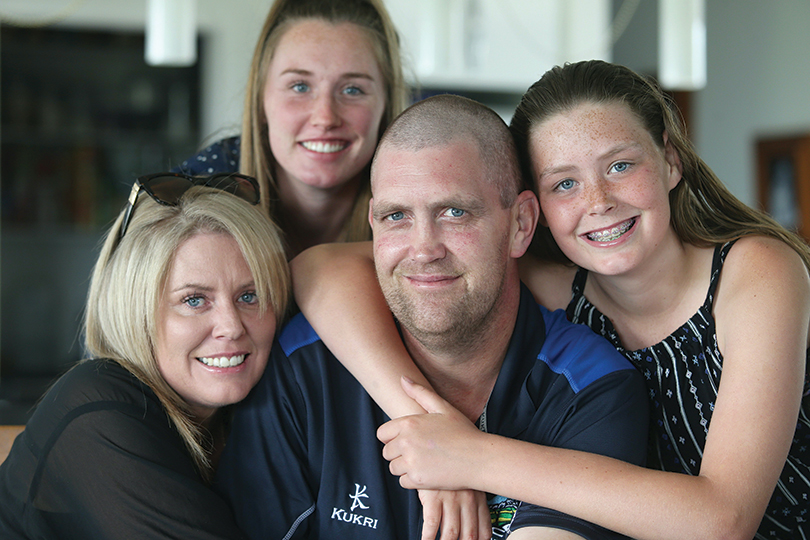
The Vining whānau (left to right) – Melissa, Della-May, Blair and Lilly.
It was a regular afternoon, a regular life, until it wasn’t anymore.
Blair and Melissa Vining had been together for 16 years. Based at Limehills, in Murihiku, their lives together revolved around the simple things: work, school, sports, friends, whānau. Parents to two daughters, Della-May and Lilly, life for the Vinings was about as good as it gets.
Then it all crumbled.
After a handful of days feeling unwell, Blair left work early one afternoon and drove to Southland Hospital in Waihōpai. He rang Melissa, just to let her know what he was up to but told her not to go with him – he knew he would be one of many in the emergency department’s waiting room. Blair was not somebody who made a fuss. Melissa knew that and for her husband to head to the hospital meant something was seriously wrong.
She jumped in her car and went to meet him. By the time Melissa arrived at the hospital, the blow had been dealt. Blair had undergone an x-ray, and it showed blood clots and tumours laced like a spider web across Blair’s lungs and liver. The disease was unfurling throughout his body: a colonoscopy showed the cancer had spread from its primary location in his bowel.
Blair was told he had just six to eight weeks to live. He was 38.
Blair and Melissa spent three days in Southland Hospital in a state of shock before he was discharged. They were assured he would see a specialist. Urgently. Soon. But shortly after they returned to Limehills they received a letter that said his urgent appointment was up to eight weeks away.
Eight weeks of agony, of uncertainty, before they would see another doctor. In the meantime, Blair’s life would hang in the balance.
“I don’t even have the words to explain how that felt, to think that somebody who was only 38 who had just been told they were dying of cancer, would have to wait longer than their prognosis before they might see a specialist. Devastating isn’t big enough,” Melissa says.
So, Melissa took the first step on what would become an unrelenting path. She turned her focus towards finding a solution, securing an appointment with Dr Chris Jackson, medical director of the New Zealand Cancer Society. A week after that initial appointment, Blair underwent his first round of chemotherapy. The next day he ended up back at Southland Hospital – this time with a bowel obstruction. The Vinings found themselves enduring their second traumatic event in less than three weeks.
“We had a thirteen-and-a-half hour wait, and still nobody – no surgeons, no nurses, nobody – available who could perform the procedure he required. Blair was in agony. I was begging the doctor
to do something, but nobody could.”
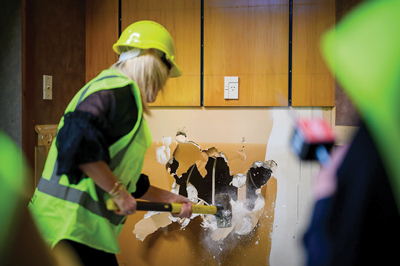
Melissa cracks in to demolition day at the Southland Charity Hospital site in Waihōpai.
Finally, they were flown to Ōtautahi, where Blair underwent the emergency procedure.
“Right from the start, it was one trauma after another; one thing that should have been available that wasn’t, to the next. It never stopped,” Melissa says. “Time after time, we saw countless examples of the system just failing people, people like us.”
The Vinings quickly learned about the inadequacy of resources in the public health system, and the ‘postcode lottery’ that sees those in the deep south – the region with some of the most alarming statistics around bowel cancer – confronted by appalling delays to access the care they need.
Aotearoa has one of the highest incidences of bowel cancer in the developed world. According to Bowel Cancer New Zealand, more than 3,000 New Zealanders are diagnosed with the disease every year and almost half that figure – 1,200 people – will die as a result. However,
if detected early, bowel cancer is largely curable.
The southern region has some of the highest incidences of bowel cancer, spread beyond the bowel at the time of treatment, and rates of emergency surgery because of bowel cancer recorded in the country. It also has one of the lowest rates of colonoscopies.
Bowel cancer screening programs often place additional strain on an already under-resourced capacity. Reports of delays in accessing care – from diagnosis to treatment – have become an almost daily occurrence in local Murihiku media. During a recent Southern District Health Board discussion around diagnostic imaging backlogs and wait times for cancer care, radiation oncologist Dr Lyndell Kelly called it “criminal” to ask patients to wait two months to discover the extent of their cancer.
Melissa never intended to be a loud voice in the chorus of people decrying the state of Aotearoa’s public health system. But when faced with the harsh reality of its failings that quickly changed.
“I think before you, or somebody you love, is told they’re sick – really sick – you have this idea that healthcare in New Zealand is fair, and it will be there to help you if you ever need it. It’s not until you or your family finds themselves in a position, the way we did, that you realise that’s just not the case at all. You learn the hard way that the system is just completely failing our community,” she says.
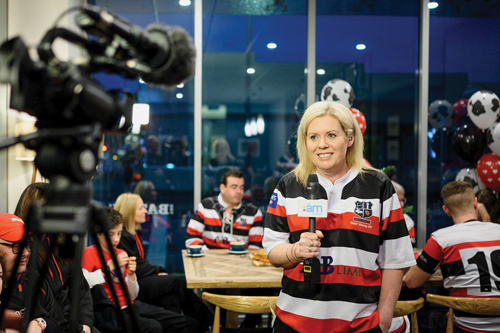
Melissa speaks to media on the inaugural ‘Buy a Brick Day’ – the campaign has generated tens of thousands of dollars for the hospital’s cause.
“We were lucky; we had medical insurance. But so many people don’t have that option available to them. To Blair, it was just so wrong.
“He never once said ‘why me’ – he just accepted his diagnosis and tried to make the most of the time he had left. But what Blair couldn’t accept was that where you lived, or how much money you had, determined whether you lived or died, or had more time with your whānau. He wanted to fight, to try and make it fairer for other people.”
Blair Vining’s Epic Journey – shared on social media, to keep family and friends updated with what he was going through and how he was chipping away at his ‘bucket list’, his must-dos while he still had time to do them – quickly morphed into something much larger.
In sharing their own experiences of the system’s failings, the Vinings were soon inundated with messages – dozens of them every day – from people whose stories were shockingly similar to their own. Blair, and by extension Melissa, became a loud voice condemning the current state of New Zealand’s public health system.
Blair Vining loved big. Melissa thinks that’s why his story captivated so many people.
“It was like people could see themselves, or their brother, or their best mate, in him,” Melissa says. “I think the way he was, so naturally warm, just made people feel a connection to him whether they knew him or not. I think they admired the way he spent his last bit of time on Earth trying to help them.
“Blair was never going to see the benefits of what he was doing. It was too late for him. But I think people could feel how hard he was fighting for them, and their families, so they didn’t go through what
he did.”
The Vinings’ fight gained traction, and their petition to create a national cancer care agency was signed by more than 140,000 New Zealanders. The pair were in Auckland when the Jacinda Ardern-led Government announced its Cancer Care Action Plan. The plan included an extra $60 million for Pharmac funding, the establishment of Te Aho o Te Kahu (national cancer control agency), and the appointment of Professor Diana Sarfati as national director of cancer control.
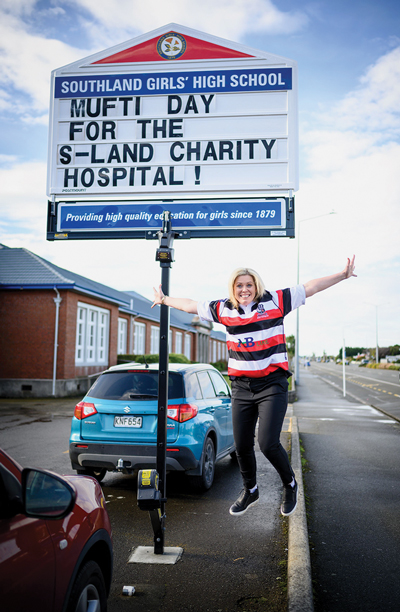
An entire community has banded together to back the cause.
But Blair and Melissa knew the people of New Zealand, especially in the south, needed real change. They needed it far faster than the wheels of politics would turn. It was Blair’s idea to just get on with what needed doing.
“I just hear his voice, all the time, in my head saying – ‘you just need to build your own hospital, babe’. He’d say if everybody in Southland bought a brick, we could just build a hospital ourselves. When it gets really hard, and it gets hard a lot, I just hear Blair. That’s what keeps me going,” Melissa says.
“To me, building a hospital sounded crazy. But it didn’t to Blair. So that’s what we’re doing.”
What seemed like an almost impossible promise is now – almost – a reality.
Blair Vining lost his battle with cancer in October 2019.
That same month the first public meeting to discuss the idea of a charity hospital drew hundreds, all keen to help drive the project forward and create an enduring legacy to a man whose courage had connected with their hearts.
Some of the best and brightest minds in the deep south have taken on governance and clinical roles, and the team behind the Canterbury Charity Hospital in Ōtautahi – the inspiration for what is being replicated in the south – has been instrumental in guiding the development of its Murihiku-based counterpart. The charity hospital will be available to all those who live within the boundaries of the Southern District Health Board zone.
In little more than a year complete strangers, businesses, kura, rural rugby teams – people from all around Aotearoa – have together raised more than $2.2 million to build the Southland Charity Hospital. Melissa is, unintentionally, the driving force behind the project.
“It makes me feel extremely emotional. I just can’t explain the feeling I get, of how proud I am, to be part of such a strong community. They’ve seen a problem and solved it themselves in such a short amount of time,” she says. “I knew if any community could pull something like this off, it would be ours. But to have people from places like Auckland, the Waikato, Australia, the United States and even Norway, hear their voices, and lend their support to our hospital, blows my mind.
“This journey has shown me the very, very best of humanity: right from little kids, who have saved up their pocket money, to the people who are in a position to make really substantial donations without wanting any recognition for their kindness. I have so much gratitude for all of them.”
That support is going to create real, tangible change for the people of Murihiku and Ōtākou.
Initial estimates to get the build started came in at about $4.5 million. Thanks to in-kind offers from tradespeople and suppliers, the donation of an entire site courtesy of the ILT (formerly known as the Invercargill Licensing Trust), and hundreds of hours of volunteer time, that cost has been revised to a little more than what is currently in the bank. Building at the site is set to begin soon with the hospital expected to be operational by April 2022.
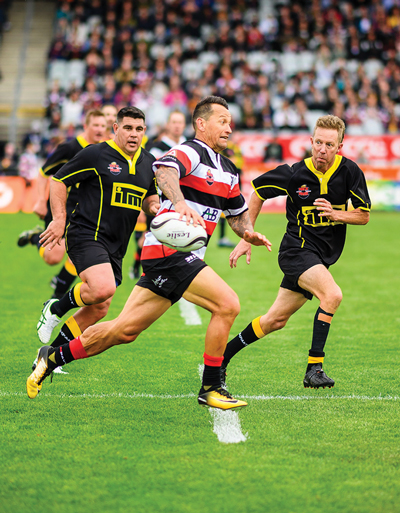
Blair Vining’s “bucket list” after his diagnosis included playing one last game of rugby with his friends.
With a vision to provide free care to those in Murihiku and Ōtākou, who are unable to access the public or private health systems, the hospital will take care of the mahi needed most urgently now – treating those with colorectal cancer. Needs of the community will continue to be assessed by the hospital’s clinical team and services will change accordingly over time.
Melissa is keen for the Southland Charity Hospital to do things differently. “I think when it comes to the Southland Charity Hospital, a solution needs to be found by the people, for the people. I don’t want our hospital to fall into the same pitfalls evident in the public health system, where decisions that do not cater to the real needs of the communities it serves, are implemented. The Southland Charity Hospital’s got to take a different approach, because this top-down decision-making is just not working.
“I want our people to be coming up with solutions that work for them. It’s a really good opportunity to learn from the failings of the public health system, which we know is failing our communities, in particular Māori and Pasifika.”
One of the lessons Melissa believes can be incorporated into the Southland Charity Hospital approach to healthcare is embracing the Māori philosophy of hauora –taha tinana (physical wellbeing), taha hinengaro (emotional wellbeing), taha whānau (social wellbeing)
and taha wairua (spiritual wellbeing). Each of the four dimensions of hauora influences and supports the others.
“I’m only in the infancy of my own journey in learning about this philosophy, but right from the beginning it’s been crucial to me that the perspectives of our whole community are interwoven into the way the Southland Charity Hospital operates,” she says.
“I really want to ensure that tikanga Māori is not only respected and followed, but forms an authentic and integral strand of the way we do things. To me, the importance Māori place on the concept of whānau and looking at the holistic, bigger-picture approach when it comes to a person’s health and wellbeing aligns with my own values. That really connects with my heart.
“I also think that approach, taking a holistic overview of a person’s wellbeing, is not just right for Māori – it’s right for our whole community.”
Melissa Vining has no plans to stop criticising what she sees as a slow, bloated, and ineffective system responsible for the deaths of many – or to ease up on her plans for the hospital.
“The hardest part of doing what I’m doing is managing my grief. I’ve had to adjust to not only being a single mum, but to living without Blair here. But I can’t just stand by and do nothing, when there is such inequality in the community. Plus, I promised Blair. It’s what Blair started, and it’s what I have to finish.”
The inaugural He Pūrongo Mate Pukupuku o Aotearoa 2020, The State of Cancer in New Zealand 2020 report released by Te Aho o Te Kahu is just one in an ever-longer list of reports detailing the inequities faced within the New Zealand health system, particularly for Māori.
Among its findings:
- Māori are 20 percent more likely to develop cancer than non-Māori (the most commonly diagnosed cancers among Māori being breast, lung, prostate and colorectal).
- There is compelling, and growing, evidence of the role of racism – systemic, internalised, interpersonal, or otherwise – as a determinant of health outcomes.
- Māori are twice as likely to die of cancer than non-Māori.
The report also identifies the positive impact kaupapa Māori and mātauraka Māori approaches have on addressing inequities within the health system (a view supported by myriad other health reports, such as the Ministry of Health’s New Zealand Cancer Action Plan 2019 – 2029).
It’s a philosophy Melissa Vining says is lacking within the country’s mainstream public healthcare framework. While she hopes the Government’s April announcement, to create a Māori health authority, will go some way in addressing this, and the clear inequities within the health system, she is not content to rely on others. There is simply too much at stake to do that.